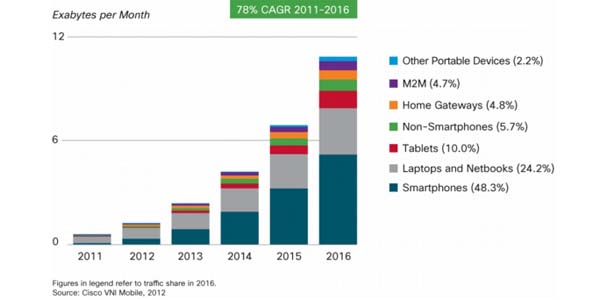Imagine that instead of a clipboard, your doctor is holding all your medical records, X-rays and prescriptions on a tablet.

In today”™s mobile market, the idea isn”™t too farfetched. Just like in the early days of the Internet, the opportunities in mobile technology are skyrocketing. Mobile traffic doubled for the fourth consecutive year in 2011 and in the next five years, it is expected to increase 18-fold, according to the Cisco Visual Networking Index.
Addressing both the risks and opportunities of the mobile market at the Tri-State Innovation Economy Luncheon in Stamford on June 21, local techies gathered to begin forming a collaborative network.
“Mobile is the single most pervasive technology ever invented,” said Brenda Lewis, keynote speaker and principal at Transaction Marketing. Businesses in every industry are exploring mobile software and applications, and those that aren”™t, Lewis said, “will get left behind.”
By 2016, 50 percent of online traffic is predicted to come from smartphones, while only 25 percent is expected to come from laptops, according to the Cisco report. Likewise, last year’s mobile data traffic was eight times the size of the entire global Internet in 2000.
While the statistics look promising for entering businesses and investors, Lewis warned there are still many challenges in the industry.
First, there is a shortage of skilled radio frequency engineers that understand electronic hardware design, circuit boards, antenna radiation and interfering frequencies. Most of these engineers date to the postwar years and are now retired, Lewis said.
Second, it can be costly to develop applications on multiple platforms. There are 6,500 web capable devices and more than 60 types of mobile app browsers, such as Apple OS and Android, which make coding a nightmare and choosing platforms a gamble. Lewis called for a single universal platform.
Then, though there are many other challenges, Lewis singled out the shortage of data capacity as a major issue. Whenever a call is dropped, a webpage loads slowly or an application lags out, Lewis said it”™s almost always the fault of the network carrying the data. There is a capacity crunch and without new technology to resolve the issue, the quality of services will decrease while the price for data only increases.
Hoping a mature mobile ecosystem will form in Fairfield County, Lewis said the area has the talent, energy, youth and money necessary to become a leader in the field and help address the issues at stake.
Gary Felberbaum, principal of the software developer Advanced Decisions, said that for his business, the opportunity for developing mobile business applications, like a medical records app, is huge. His company currently creates business-to-business software but as interest in mobile applications increases, Felberbaum sees his company moving with the demand.
“There is an equal number of opportunities and risks,” Felberbaum said. “It opens your mind to things you didn”™t think were possible.”


















